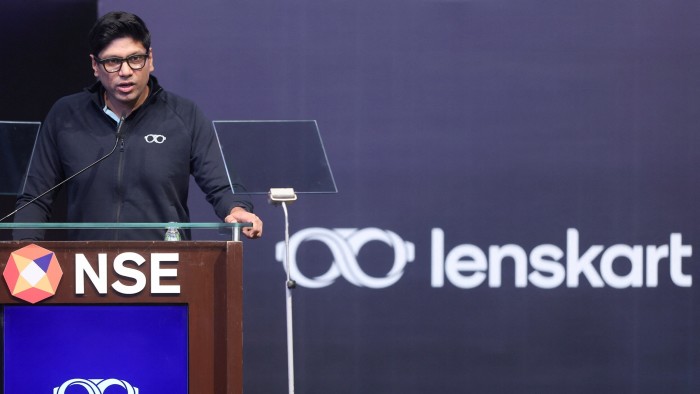Stay informed with free updates
Simply sign up to the Indian business & finance myFT Digest — delivered directly to your inbox.
A SoftBank-backed Indian eyewear retailer seesawed in its Mumbai trading debut after raising $821mn, in an illustration of concern over heady valuations that have helped drive a boom in Indian initial public offerings.
Shares in Lenskart Solutions, which were issued at Rs402 ($4.53), initially tumbled as much as 11 per cent and later traded flat despite the offer being subscribed 28 times, largely by institutional investors.
Its listing comes during an Indian IPO boom as many businesses seek to take advantage of a stock market rebound after turbulence caused by US President Donald Trump’s tariff threats. This year’s IPO haul is on track to surpass last year’s record of $21bn.
The valuations of companies in the country have been propped up by a flood of retail money pouring into the mutual fund industry, as more middle-class households punt their savings into the stock market.
In the run-up to the listing, investors had been debating Lenskart’s valuation. Lenskart’s valuation has jumped from $6.1bn in June to $7.7bn at the time of the listing, according to start-up database Tracxn.
Even brokerages that have recommended buying and holding the company’s stock over the long term, including SBI Securities and Aditya Birla Capital, said the listing was richly priced.
The valuation “seems to be stretched and hence listing gain is likely to be muted”, said analysts at SBI Securities. “However, looking at the robust business model, the company is well placed to encash on the fast-growing domestic organised underpenetrated eyeglasses market.”
Lenskart turned profitable in 2025 with revenue growing 23 per cent to Rs66.5bn compared with a year earlier. The company had a price-to-earnings ratio of about 238:1.
“It’s a profit-making company, but still the valuations look stretched,” said Kranthi Bathini, director of equity strategy at WealthMills Securities.
Indian mutual fund DSP Asset Managers took the rare step of defending its investment in the eyewear maker and retailer. In a post on X last week, it said Lenskart had a “strong and scalable business”, while recognising that Indian retail and ecommerce businesses “are trading expensive”.
Update
Usually, we do not comment on individual stocks that may or may not be part of our portfolios. However, given the questions and concerns on social media over the last 24 hours, we felt it is important to share clarity with our investors.
We have always been selective in…
— DSP Mutual Fund (@dspmf) October 31, 2025
“High valuation has been the most common investor concern on Indian equities,” said Goldman Sachs analysts in a recent note, adding that “we forecast India’s fair value to be 5% below current levels over the next couple of years”.
Just before the listing, Lenskart’s founder and chief executive Peyush Bansal — who is also a judge on the television show Shark Tank India — addressed the criticism.
“We didn’t build Lenskart to reach a valuation,” Bansal wrote. “We built it to reach people — from the heart of Delhi to the smallest towns in the north-east.”
Lenskart has become the largest formal eyewear retailer in India and now operates almost 3,000 physical stores at home and overseas in the Middle East and south-east Asia, according to the company.
But many retail investors were becoming savvier in which newly listed companies to invest in, said WealthMills’ Bathini.
“At the beginning of the start-up and IPO boom the promoters had vision and the retail investors had money,” he said, referring to a legal Indian term for a company’s founders.
“The promoters now have the money and the investors have the vision.”




